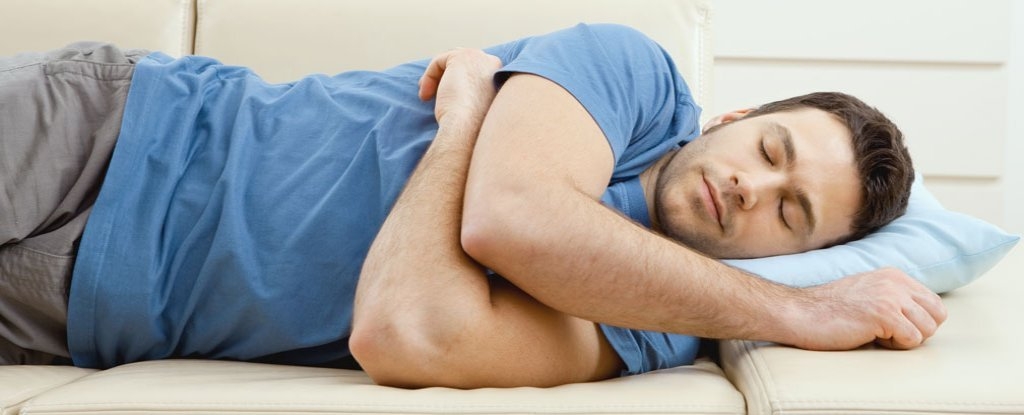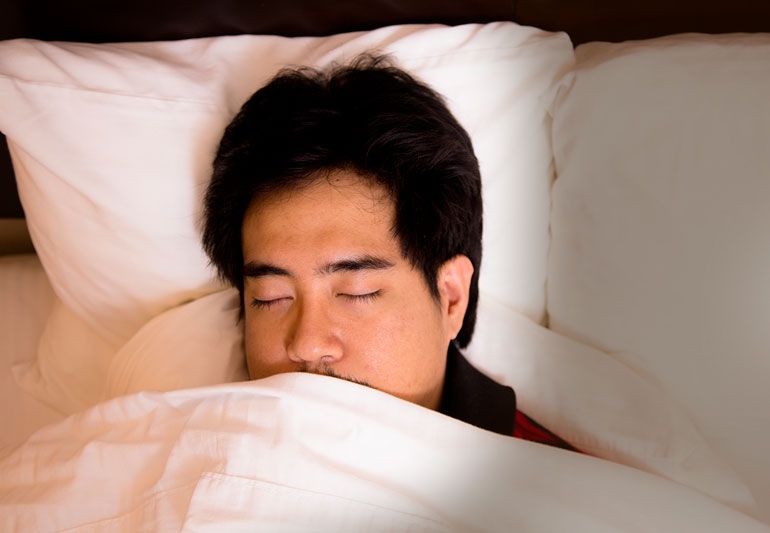How To Stop Snoring: Home Treatment and Doctor's Advice
 |
| Photo Help Guide |
Why do people snore?
If you snore, you’re not alone: Up to half of all American adults snore. It happens when air flows through your throat when you breathe in your sleep. This causes the relaxed tissues in your throat to vibrate and cause harsh, irritating snoring sounds.
Snoring may disrupt your sleep, or that of your partner. Even if it’s not bothering you too much, it’s not a condition to ignore. In fact, snoring may be a sign of a serious health condition, including:
-Obstructive sleep apnea (blocked airways)
-Obesity: an issue with the structure of your mouth, nose, or throat sleep deprivation.
Self-treatment Tips
1. Lose weight if you are overweight.
This will help reduce the amount of tissue in the throat that might be causing your snoring. You can lose weight by reducing your overall caloric intake by eating smaller portions and more healthy foods. Make sure you get regular exercise daily. You may also consider seeing your doctor or a nutritionist for help.
READ MORE: Best WAYS to Lose Weight by Doing Exercise?
2. Relieve stuffiness
In people with chronic nasal congestion, medications like antihistamines or steroid nasal sprays can help you breathe easy — and turn down the dial on the nighttime noise.
3. Open your nose
Opening your nasal passages at night can help cut down on snoring. Adhesive nasal strips placed on the bridge of the nose lift your nostrils open to improve airflow. Another option is nasal dilators, which you insert into the nostrils to expand the nasal opening. Both strips and dilators are inexpensive and easy to find at the drugstore.
4. Sleep on your side
 |
| Photo Science Alert |
Sleeping on your back sometimes causes the tongue to move to the back of the throat, which partly blocks airflow through your throat. Sleeping on your side may be all you need to do to allow air to flow easily and reduce or stop your snoring.
5. Limit or avoid alcohol before bed
Try not to consume alcohol for at least two hours leading up to your bedtime. Alcohol can relax the throat muscles, causing snoring.
6. Avoid taking sedatives before bed
If you snore and take sedatives, talk to your doctor to see what your options are. Stopping sedative use before bed may ease your snoring.
7. Stop smoking
Smoking is an unhealthy habit that can worsen your snoring. Talk to your doctor about therapies — such as gum or patches — that can help you quit.
READ MORE: How to Quit Smoking Effectively?
Doctor-approved ways to stop snoring
 |
| Photo News Binding |
If tennis balls and nasal strips don’t do the trick — or if you have symptoms of sleep apnea — talk to your doctor about these proven remedies that address both snoring and apnea.
| When to see a doctor It may be difficult for you to determine how often you snore and the source of your snoring. If you have a bed partner or roommate, ask them about your symptoms and snoring frequency. You can also identify some symptoms of snoring on your own. Common snoring symptoms include: -Breathing from the mouth -Having nasal congestion -Waking with a dry throat in the morning -Having difficulty with memory or concentrating -Feeling sleepy during the day -Having a sore throat -Gasping for air or choking during sleep experiencing chest pain or high blood pressure |
After your doctor establishes your snoring frequency, you can work together to create a treatment plan to help with your symptoms.
1. Embrace the CPAP
Continuous positive airway pressure (CPAP) is considered the gold standard treatment for sleep apnea and snoring. You wear a mask over your nose or mouth that blows air into your airways while you sleep. The pressurized air keeps your airways open while you doze.
In the past, the devices were bulky and uncomfortable and had a less-than-stellar reputation. But they’ve come a long way, Dr. Reisman says. “Today’s machines are streamlined, small and quiet, with different attachments to make them comfortable,” he says. “It can take a little time to get used to it, but it solves the snoring and sleep apnea problem immediately.”
2. Get fitted for an oral appliance
If a CPAP doesn’t agree with you, an oral appliance can bring you snoring relief. These mouthguard-style devices hold the lower jaw forward while you sleep — a posture that helps the airway stay open.
Though some over-the-counter varieties are available, Dr. Reisman recommends going to a dentist or oral surgeon for an appliance customized for your mouth. “A badly fitting appliance can strain the jaw and trade one problem for another,” he says.
3. Upper airway surgery
There are a number of procedures that seek to open the upper airway and prevent significant narrowing during sleep through a variety of techniques.
For example, in a procedure called uvulopalatopharyngoplasty (UPPP), you're given general anesthetics and your surgeon tightens and trims excess tissues from your throat — a type of face-lift for your throat. Another procedure called maxillomandibular advancement (MMA) involves moving the upper and lower jaws forward, which helps open the airway. Radiofrequency tissue ablation employs a low-intensity radiofrequency signal to shrink tissue in the soft palate, tongue or nose.
A newer surgical technique called hypoglossal nerve stimulation employs a stimulus applied to the nerve that controls forward movement of the tongue so the tongue does not block the airway when you take a breath.
The effectiveness of these surgeries varies and the response can be challenging to predict.Uvula/palate surgery: A large uvula — the soft tissue that dangles from the edge of the soft palate — can lead to snoring. “Surgery to remove the uvula and/or a portion of the soft palate can improve snoring and apnea,” Dr. Reisman explains.
4. Implantable nerve stimulator
This treatment involves surgery to place an implant alongside nerves in the throat. Surgeons implant a pacemaker-like device into the chest. The device monitors your breathing and stimulates the throat muscles to open the airways, preventing apnea.
 Best times to sleep for different age groups Best times to sleep for different age groups Scientific research makes clear that sleep is essential at any age. Sleep powers the mind, restores the body, and fortifies virtually every system in the ... |
 What To Do If You've Got Sleeping Problems Due To Noise? What To Do If You've Got Sleeping Problems Due To Noise? Loud surroundings can be a major disruption to sleep quality and quantity. Sounds can prevent you from drifting off right away or could pull you ... |
 10 secrets for a sound sleep at night 10 secrets for a sound sleep at night When people have a difficuty in sleeping, they often use drugs immediately to get a better sleep at night. However, you are able to try ... |



























